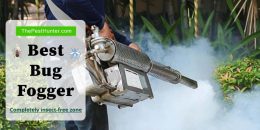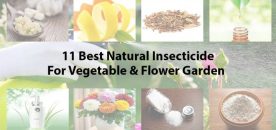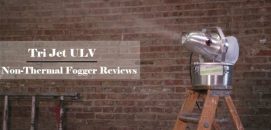Hiding behind every beautiful and profitable thing is something harsh. Therefore, behind every fruitful and blossoming garden, there is the harsh reality of the process of getting rid of the harmful insects. Well, it is not that harsh as those insects harm the plants but then again, some of the beneficial insects lose their life in this process too.
So, people use insecticides to kills the harmful insects taking control over their vegetable garden. However, as you all know, insecticides are killers and therefore, they do not just harm the insects but also the soil, plants, and health of those who consume these.
Therefore, it is important for gardeners to find the best insecticide for vegetable garden that will maximize effective killing for the harmful and minimize harm to the rest.
Our Picks For Best Insecticide
- FMC Talstar P Insecticide 1 Gal Roaches Fleas Spiders Ants Stink Bug – best for use in residential, commercial, industrial, and food handling areas
- Control Solutions 82003599 Taurus SC Termiticide/Insecticide – best for killing Ants, Beetles, Black Widow Spiders, Cockroaches, Termites
- Bayer – 4031982 – Suspend SC -Insecticide – 16oz – best For Use in and around: Indoors and outdoors, including food handling areas
- Demon Max Insecticide Pint 25.3% Cypermethrin – best For Use termites control
- Control Solutions CSI – 82004504 – Permethrin SFR – Termiticide/Insecticide – 32oz
Recommended Insecticide Reviews
1
Control Solutions 82003599 Taurus SC Termiticide/Insecticide
Looking for a silent killer that will take care of the termites and other colonizing insects for you? Then, the Taurus SC is the best insecticide for lawns that you take care of! The features that will help you are:
CSI – 53883-279 – Taurus SC – Termiticide/Insecticide…..
- It is a non-repellant insecticide so termites cannot detect it when you apply it to your lawn.
- You can use it for the occasional invaders as it is labeled for barrier application.
- Not quite suitable for the indoor application.
- Has a water-based 9.1% suspension concentrate of Fipronil.
- It works on species of ants, beetles, termites, spiders, etc.
5 of 5 Stars
What this insecticide will mainly help you do is take care of the colonizing insects. One insect comes in contact with it without detecting it and spreads it to its colony when it returns. Some of you might be thinking about using it on the complete vegetable garden but that is something no one advises you to do.
Because this is a very strong insecticide and it will kill even the beneficial and loving insects that exist in the garden. Therefore, use it only where you need to and it will do its job faster than other insecticides while keeping your garden free from danger for quite some time.
-Faq-
How should it be used?
The instructions are quite simple. You have to mix 0.8 oz. of the insecticide with one gallon of water to make a 0.06% concentrated solution. Then, you have to spray it on the targetted area.
How long can we keep using the product?
You can, in fact, keep using the insecticide for about three years if you keep it like it should be kept- Dry and cold.
What we liked
- Very effective on the targeted pests.
- Works really fast like within one to three days.
- Completely gets rid of colonizing insects for a while.
- Does not harm humans or other animals once it is dry.
What we didn’t like
- Not for application on the whole garden as it can kill essential insects too soon.
- Not great for fleas.
2
FMC Talstar P Insecticide 1 Gal Roaches Fleas Spiders Ants Stink Bug
If you want an insecticide to not only cover the whole of your large garden but also keep it free from certain insects for more than three months then. The FMC Talstar P Professional is definitely the best insecticide for a vegetable garden. The features that will amaze you are:
FMC Talstar P Insecticide 1 Gal Roaches Fleas Spiders Ants Stink Bug…..
- It is capable of dealing with seventy-five different species of insects.
- You can even use it indoors. Yes, it is that safe.
- It will not only take care of the initial intense infection by the insects in your garden but will also keep them away from your garden for about three months.
- You can use the 3/4 gallon to create many more gallons of insecticide spray for an application.
- Great for fleas, other yard pests, and even termites.
4.5 of 5 Stars
Therefore, you do not just kill the enemies of your garden for the moment but for three long months with this highly-effective insecticide. While we learned earlier that organic insecticides are slower to react.
This insecticide proves us wrong with its speed of dealing with the insects. Apart from that, it comes in a generous quantity as well. All you have to do is miss it with water and spray it on your garden.
-Faq-
What is the form it arrives in?
It comes in its concentrated form. So, you have to mix the right amount of water to it before application. How much concentrated you keep it depends on the insect and number of them conquering your vegetable garden.
Can you use it to kill cockroaches inside the house?
Yes, absolutely. It is both capable of dealing with cockroaches and for indoors. You will face no problem at all there but only success against those little devils.
What we liked
- Deals with a good number of species.
- Generous in quantity for the price.
- The effect lasts for about three months after use.
- Can be used indoors so the level of toxicity is not much.
What we didn’t like
- Needs some preparation on the user’s part before use.
3
Bayer – 4031982 – Suspend SC -Insecticide – 16oz
Want to wake up to the hundreds of roaches, fleas or the insect’s dead bodies that haunted you just yesterday around or inside your house? Then, this is one of the best pesticides that will not disappoint! Take a look at the features:
Bayer – 4031982 – Suspend SC -Insecticide – 16oz…..
- Capable of dealing with about fifty species of insects.
- Contains pyrethroid in it.
- Does not just knock the insects down but leaves a residue that does not let the insects be reborn.
- Safe for use even around food areas (Low toxicity).
- It works well on porous surfaces as well.
4.5 of 5 Stars
If you are super irritated and grossed by the advent of insects inside your house, you can even fight with the insects in their natural habitat and kill them in their home ground (Even though that’s a cruel thing to do but they feed on your vegetables!).
In fact, not only is this insecticide effective way beyond its application date, it lasts long too. Apparently, it works quite well even in low concentrations and you can use one pint to make 64 gallons of solution!
Apart from that, it does not have any odors or other disturbing effects. However, in order for it to deal with the eggs of the insects you will have to mix it with something extra or else it won’t work well.
-Faq-
How effective is this insecticide for indoor fleas?
Well, you will not find it very effective for the indoor fleas as you cannot spray this according to your wishes inside the house.
How much should of it should be added to a gallon of water?
You will find the proportion of the solution in the directions. But, it usually suggests 0.25 to 0.75 ounces of it to be added to a gallon of water.
What we liked
- This insecticide deals with a wide range of species.
- Can operate at low concentrations and one pint produces a generous amount of solution.
- The effect lasts quite long and insects won’t come back too soon.
- Low toxicity makes it safe for indoor and food-area usage.
- No irritating side-effect like odors.
What we didn’t like
- Should be mixed with something else to deal with eggs of the insects.
- No equally effective on all species.
4
Control Solutions CSI – 82004504 – Permethrin SFR – Termiticide/Insecticide
If you are specifically looking for the best insecticide for mosquitoes then you do not have to look further than this. Control Solutions will definitely solve your problem for you. How? With the following features:
Control Solutions – 82004504 – Permethrin SFR – Termiticide/Insecticide…..
- It will kill any insect that is not resistant to Permethrin.
- Keeps killing the insects with its residual for about three months straight.
- Can be used indoors on clothes as well.
- Knocks down the insects instantly.
- Stains darker furniture and plastics as well.
4 of 5 Stars
One thing you should know about this insecticide is that it is not effective on all species of insects but a specific few and you get the best result from those cases. For example, mosquitoes, fleas, spider and ants are the type of insects it generally gets rid of.
While you can surely use it indoors, you have to be careful what you spray it on. The manufacturer warns about it leaving stains on dark furniture but you should be more careful as it leaves stains on plastics as well.
As long as you get the delivery right, the target species right and the place for spraying right, you should not have any complaints about this insecticide.
-Faq-
What is the insecticide to water ratio for using it on clothes?
Apparently, you have to use a solution of 0.5% to use the insecticide on clothes. This basically means that if you use 5 units of the insecticide the water should be in 1000 units.
What would be the difference in the usage of 36.8% and 10% permethrin?
The difference is mainly the intensity of each of the insecticides. Apparently, the one with less intensity 10% water-based one is for indoor use while the 36.8% one is for outdoor usage.
What we liked
- Capable of removing certain species much better than others were able to do.
- The residual is quite strong and keeps the garden free from the species for quite long.
- Safe for use indoors and even on clothes so the toxicity is low.
What we didn’t like
- Leaves stains on certain furniture.
5
Demon Max Insecticide Pint 25.3% Cypermethrin
If you want to get rid of those insects that live inside cracks and crevices then the Demon Max Insecticide might be able to bring their dead bodies out for you. Apart from that, this insecticide is great for spot treatments as well. Now, let’s know about its features:
Demon Max Insecticide Pint 25.3% Cypermethrin…..
- It contains a low concentration of Cypermethrin in it which is highly effective against about 20-30 species of pests.
- You will be able to make 32 gallons of spray with this.
- Does not dissolve in water that easily keeping the water supplies safe.
- Promises long residual effect that keeps your lawn and house free from the insects.
- Extremely effective against spiders that line in the cracks.
4 of 5 Stars
Now, if you are scared or disgusted by those eight-legged spiders and other insects inside and outside your house, then just apply this insecticide and see them die right before your eyes. Beware that you might feel like Neville from Harry Potter when this happens only in this case the spider and a few other pests actually dies.
Furthermore, it will protect your land from further attacks for quite some time. However, the range of species it works on is not that long and you might find it ineffective against certain insects you were planning to get rid of.
-Faq-
Is it good for indoor usage?
Unfortunately, many would not recommend using this insecticide indoors as it may take a toll on your carpets and furniture. Apparently, it might leave a stain on those things.
Does it have any odor?
Yes, it does.
What we liked
- Does not dissolve in water easily so it will is safer to use for the soil than other insecticides.
- Very effective against Subterranean and Formosan species of insects.
- Works very fast on insects it is made for.
What we didn’t like
- Does not work on too many species.
- Might not have a great residual effect.
Types of Insecticide
You will basically find four types of insecticide and any of them may prove to be the best insecticide for you!
1. Organic Insecticide:
It does not matter where you see the term ‘organic’, it just grabs your positive attention, doesn’t it? When we are talking about organic insecticides we mean insecticides that do not have any artificial chemical in them but only the naturally occurring ones.While organic insecticides do cause less harm than others because of their natural content. They still do cause a bit of harm as they are naturally toxic. Apart from that, these insecticides break down faster. They mostly contain chemicals like Spinosad, neem oil, etc.
2. Synthetic Insecticide:
As you can guess from the name again, artificial chemicals make synthetic insecticides. Since these chemicals are artificial, they cause more harm to the environment and other beings. Apparently, they have the tendency to accumulate in the environment as well.In fact, you cannot limit the use of these insecticides within an area or against a limited species. It tends to spread and cause harm to both the harmful and the beneficial insects and other beings.
3. Liquid Insecticide:
You will usually find this insecticide in a concentrated liquid form with which you need to mix water. Apparently, it is the best form as the ones that you can use instantly have less effectiveness as they react with water for long.Apart from that, the liquid form makes it easy to drench every part of the plant with a spray. However, it is also a disadvantage as not all the parts do not need the insecticide. Moreover, a human is exposed to the chemicals and while mixing this insecticide, therefore, he needs appropriate protection with masks.
4. Granule Insecticide:
Well, this is the type which comes in the form of granules. Therefore, you can spread it more accurately in places where you think insects persist the most. However, this will lead to insects flourishing in one side and dying in the other.So, it is better to spread the granules uniformly throughout the garden. Apart from that, you can use it without prior preparation so it saves time and energy.
Organic Insecticide vs Synthetic Insecticide
Now, there are definitely some basic differences between organic and synthetic insecticides some of which are quite obvious and others are not. So, we explain both:
- Composition: Both of them contain chemicals that can kill. However, the organic insecticides contain chemicals without any alteration, that is, chemicals that are from natural sources. On the other hand, synthetic insecticides contain altered chemicals for specific objectives.
- Target: Synthetic insecticides usually target a certain species while organic insecticides usually affect more species but rather mildly.
- Length of time: Although the use of organic insecticides is on the increase, one particular quality of the synthetic ones keep people from giving it up. In fact, synthetic chemicals do the job much faster.
As they are specifically manufactured to kill a certain species with stronger chemicals. On the other hand, the organic ones take much longer and many more applications.
- Environment-friendliness: The bad news is that none of the insecticides are environmentally friendly as both function for the termination of a living being. However, organic ones are definitely much less harmful than the synthetic ones for obvious reasons. But, they still might cause different harmful effects.
- The Manufacture Process: While most of our concern was about how the insecticides affected the garden and the environment around it. Another crucial consideration is how the manufacturing process affects the surroundings.
You can guess that the synthetic insecticides definitely have a more harmful manufacturing process as it involves the creation of many chemicals. On the other hand, organic ones also cause harm in this phase but in lesser volume.
- Effect of health: You ultimately eat some of the chemicals of the insecticide you use with your food since they get in the vegetables. Although the synthetic insecticides work on the insects super fast and get rid of them, it takes a more long-term approach on your health to harm it.
Therefore, the effect of it on your health is long-term and harmful. On the other hand, organic ones also cause harm but they usually do not last long and are less harmful.
A Quick Look at our Selection of Best Insects Fogger Reviews
Organic Insecticides
You already know what organic insecticides are and more. Now, let us know about the four kinds of organic insecticides that are very handy to have.
1. Pyrethrin-Based Insecticides:
Basically, Pyrethrin is something derived from the flower of a plant called pyrethrum chrysanthemum plant ( thus the name, easier to remember). Now, you will find its presence in a number of insecticides including synthetic ones. Then, why are we calling it organic?
Well, when you use it alone or with another organic chemical then it acts like an organic insecticide for you. Apparently, you have to use it in adequate doses to actually get rid of the wide range of insects like cockroaches, wasps, fleas etc. that it is capable of getting rid of. Apart from that, it is quite safe for use as it has a low toxicity level and thus it fulfills its role as an organic.
2. Neem Oil:
Now, this multi-talented plant making it to the list of being an organic insecticide might surprise you. However, that is what you expect from multi-taskers! So, neem after gaining a huge reputation in the world of skincare and medicine has made it to this world of insecticides as well.
In fact, not only does oil extracted from neem kill the some of the species of the insects but prevents them from growing again too. You can already guess its toxicity level knowing that people use it on their skin and even takes bath with it.
3. Soap-based Insecticides:
One component that you will surely find in these kinds of insecticides is potassium. And, potassium is mixed with either long-chain fatty acids or short-chain fatty acids. However, people prefer using longer chain ones as they are less toxic than the shorter chain ones.
These soaps usually need to be dissolved in water to be applied. While using water you should be careful that you are using soft water as the chemically hard water tends to create precipitates when in contact with such soaps. When you are done with mixing, just water the plants.
4. Essential Plant Oils Repellents and Insecticides:
Like neem oil, essential plant oil are another natural blessings that do not just protect skin and health but also the vegetable gardens.
Apparently, these natural oils are collected from plants like eucalyptus, lavender, rosemary, cedar, etc. In fact, they are effective against quite a number of species and also prevents them from growing back.
Safety Tips for Using Insecticides in Your Garden
We have mentioned again and again how the insecticides will cause harm no matter how organic they are. After all, they kill living beings even after being dissolved in water, don’t they?
So, can you imagine how harmful they can get when they come in direct contact with you when you are using them? In order to minimize the harm caused, you should take the following measures:
- Read the Label: The very first step to being safe is to know what you are dealing with. Mark the dos and don’t of the insecticides and work accordingly. Try to understand each of the instructions of use clearly and avoid mishandling in any way.
- Be Properly Dressed: Just the way you have to wear an apron in a science laboratory, you must wear gloves, mask and if possible long sleeves when you are dealing with insecticides. This will prevent any damage to your skin and hands via direct or indirect contact.
- Handle carefully: You are not supposed to run with the insecticides in your hand and fall over. Therefore, handle the bottles very carefully so you not spill it or break it. Imagine what would happen to your eyes if some insecticide ever got into it and be scared enough to handle it carefully. Because we are sure, you cannot be the next DareDevil.
- Store in the original bottle: If you have received the insecticide in one piece and it has not caused any problems until now, then you should know that the bottle it arrived in it is the best for it to be stored in. Therefore, carefully store the bottle in a cool place where kids cannot reach.
- Disposal: Never use the empty containers of the insecticide for any new or any other purpose at all. Just dispose of them at the appropriate location and make sure there are no animals or children who can reach it there.
Our Last Opinion
You might be looking for the best granular insecticide or the liquid one, the most effective one or the most non-toxic one, whatever it is, you just need the best for your lawn. Unlike many other things, you cannot get rid of your lawn if it becomes futile.
And, as you know, the insecticides used on your lawn play a huge role in how your land performs. Therefore, you should definitely get the best insecticide for your vegetable garden and your house. You already know about the best organic ones available and if that is what you are looking for, what are you waiting for? Just go buy one that suits you!









![Best Roach Fogger Review [Updates on 2021] & Ultimate Buying Guide](https://thepesthunter.com/wp-content/uploads/thumbs_dir/Best-Roach-Fogger-Reviews-e1568444895799-om2xg48ncl0360dmgwjzrnodv3wuus03u350nuwxzo.jpg)



